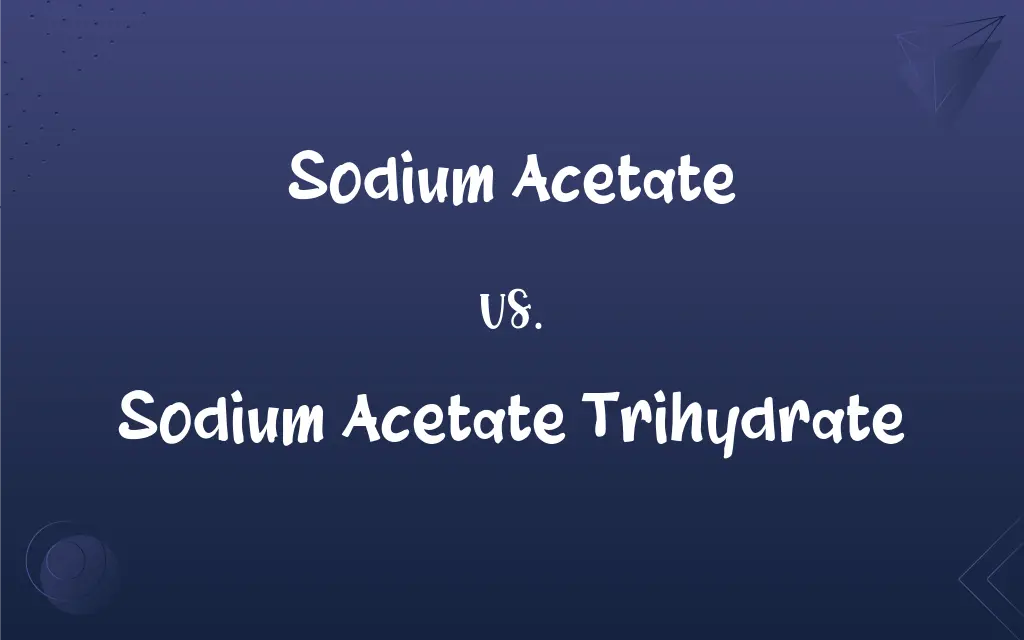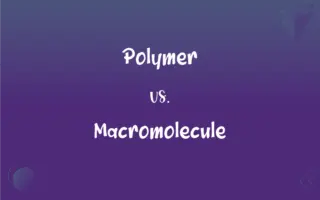Sodium Acetate vs. Sodium Acetate Trihydrate: What's the Difference?
Edited by Aimie Carlson || By Janet White || Published on December 27, 2023
Sodium acetate is a sodium salt of acetic acid, anhydrous; sodium acetate trihydrate contains three water molecules.

Key Differences
Sodium acetate is a chemical compound with the formula CH3COONa, used in various industrial and laboratory processes. Sodium acetate trihydrate, on the other hand, is the hydrated form of sodium acetate, containing three molecules of water (H2O) for each unit of sodium acetate.
In terms of physical properties, sodium acetate is typically a white, hygroscopic powder, while sodium acetate trihydrate appears as colorless crystals. The presence of water in sodium acetate trihydrate influences its physical state and stability.
From a chemical perspective, sodium acetate is more reactive due to the absence of water molecules, making it suitable for reactions needing anhydrous conditions. Sodium acetate trihydrate, with its water content, is often used in applications where mild conditions are required.
In practical applications, sodium acetate is used in the textile industry and as a food preservative. Sodium acetate trihydrate finds use in heating pads and hand warmers, where it releases heat upon crystallization.
Both compounds are forms of sodium acetate, their chemical and physical properties differ due to the presence or absence of water molecules. This difference defines their suitability for various applications in industry and research.
ADVERTISEMENT
Comparison Chart
Chemical Formula
CH3COONa
CH3COONa·3H2O
Physical State
White, hygroscopic powder
Colorless crystals
Water Content
Anhydrous (without water)
Hydrated (contains three water molecules)
Reactivity
More reactive (anhydrous)
Less reactive (due to water content)
Common Uses
Textile industry, food preservative
Heating pads, hand warmers
ADVERTISEMENT
Sodium Acetate and Sodium Acetate Trihydrate Definitions
Sodium Acetate
It's used in heating pads due to its exothermic properties.
When activated, heating pads containing sodium acetate release heat.
Sodium Acetate Trihydrate
Acts as a concrete additive to accelerate curing.
Sodium acetate trihydrate is added to concrete mixtures in cold weather.
Sodium Acetate
It acts as a buffering agent in medications.
Sodium acetate is added to IV solutions to help maintain pH balance.
Sodium Acetate Trihydrate
It serves as a source of sodium ions in solutions.
Sodium acetate trihydrate is used to prepare buffer solutions in labs.
Sodium Acetate
Sodium acetate is a sodium salt of acetic acid.
Sodium acetate is used as a condiment in some snack foods.
Sodium Acetate Trihydrate
It's a safe and non-toxic food preservative.
Sodium acetate trihydrate extends the shelf life of certain dairy products.
Sodium Acetate
It's used as a food preservative, denoted as E262.
Sodium acetate is often found in potato chips to enhance flavor.
Sodium Acetate Trihydrate
Sodium acetate trihydrate is the hydrated form of sodium acetate.
Sodium acetate trihydrate crystallizes to release heat in hand warmers.
Sodium Acetate
In industrial settings, it's used for waste water treatment.
Factories use sodium acetate to neutralize sulfuric acid in waste.
Sodium Acetate Trihydrate
Commonly used in heating pads for its phase change properties.
The crystallization of sodium acetate trihydrate in pads generates heat.
FAQs
What are the industrial uses of sodium acetate?
Used in textile dyeing, food preservation, and as a laboratory reagent.
Can both be used in heating pads?
Sodium acetate trihydrate is preferred for its heat-release upon crystallization.
What is the role of sodium acetate in waste water treatment?
It neutralizes acidic components like sulfuric acid.
Are both compounds used in food preservation?
Yes, both are used, but their application varies based on moisture content.
Is sodium acetate trihydrate used in laboratories?
Yes, mainly in buffer solutions due to its stable pH and water content.
What is sodium acetate?
A sodium salt of acetic acid, used in various applications.
Can they be interchanged in industrial applications?
Not always, due to differences in water content and reactivity.
What distinguishes sodium acetate trihydrate?
It's sodium acetate with three water molecules, used differently due to hydration.
Does sodium acetate trihydrate have a different melting point?
Yes, due to its water content, it has a different melting point.
What is the chemical formula of sodium acetate?
CH3COONa.
Is sodium acetate hygroscopic?
Yes, it tends to absorb moisture from the air.
Is there a difference in pH levels between the two?
They maintain similar pH levels but may behave differently in solutions.
Are they environmentally friendly?
Generally, both are considered safe for the environment.
How does sodium acetate trihydrate work in concrete?
It accelerates curing, especially in cold weather.
Are both forms safe for human consumption?
In regulated amounts, both are safe as food additives.
And for sodium acetate trihydrate?
CH3COONa·3H2O.
Can sodium acetate be used in food as a flavor enhancer?
Yes, it's often added to snacks like chips.
What is the use of sodium acetate trihydrate in hand warmers?
Its crystallization releases heat, ideal for hand warmers.
Can either form be used in photography?
Sodium acetate is sometimes used in photochemical processes.
How are they manufactured?
They are synthesized from acetic acid and sodium carbonate or bicarbonate.
About Author
Written by
Janet WhiteJanet White has been an esteemed writer and blogger for Difference Wiki. Holding a Master's degree in Science and Medical Journalism from the prestigious Boston University, she has consistently demonstrated her expertise and passion for her field. When she's not immersed in her work, Janet relishes her time exercising, delving into a good book, and cherishing moments with friends and family.
Edited by
Aimie CarlsonAimie Carlson, holding a master's degree in English literature, is a fervent English language enthusiast. She lends her writing talents to Difference Wiki, a prominent website that specializes in comparisons, offering readers insightful analyses that both captivate and inform.






































































